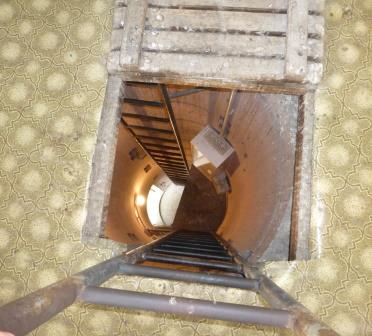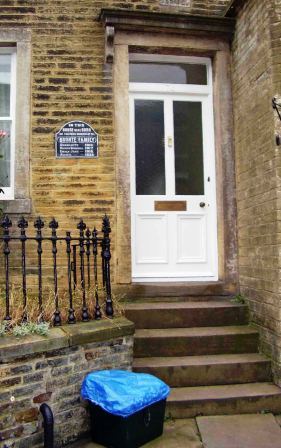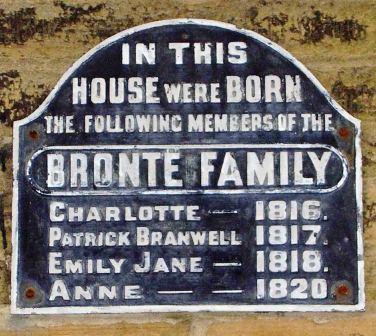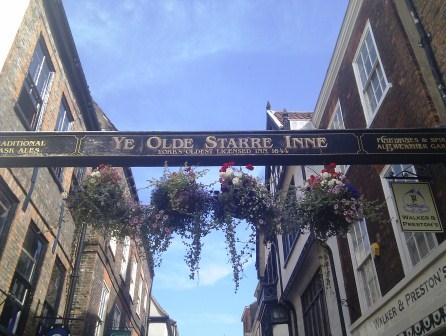Well, ‘the end’ might be an over-dramatic way of putting it but it does mark a significant watershed: 1st October (tomorrow at the time of writing) marks the end of my Creative Writing MA course. It’s the day that we students have spent just over three years persevering towards — when we hand over the fruits of our labours to the tutors at Manchester Metropolitan University to cast their verdict.
It’s also why, when there are only a couple of hours left in the whole month of September, there have been no updates on this blog during the month. Getting the novel into a decent enough shape to submit as a text for academic assessment has been bloody hard, knackering work — about two months intense effort over and above the normal writing time I try to eke out around the day job and other commitments — so not enough time even to post up the holiday photos I hinted about in the last update (but persevere to the end of this post and any disappointment might be alleviated in that department).

Part of the reason it’s been something of a grind is that I’d not realised, until it was mentioned by fellow students, Kerry and Anne, that we were required to hand in hard copies of the novel — it’s effectively the dissertation component of the Masters degree — and with a dissertation the university requires the document not only to be physically printed but professionally bound like, er, a real book!
Fortunately there’s no additional commentary or analysis required (that tends to come at PhD level) but, with a minimum word count of 60,000, it’s a very weighty document for all students. And, as I have no worries about meeting the minimum word count (thankfully there isn’t maximum), then I’m expecting my dissertation to be something of a bookend when I pick my copy up from the bookbinders.
Interestingly, my MSc dissertation for the OU was a much more manageable 17,500 words — not much of gripping story there, though — and I was able to submit that purely electronically. I later had it printed and bound for my own reference — and it sits doing a bit of bookshelf ego massaging next to the MBA dissertation from years ago that I actually printed on an inkjet printer before having it bound (that would probably cost me about £500 in ink if I tried it now on my current money pit of an HP printer).
It seems ridiculous to have been working on a novel for so long and to have to suddenly shift into a higher gear when the end of the course suddenly creeps up. But I guess that’s the way of deadlines — I know from some of my published and agented friends how they’re often set exacting deadlines. Most published books would probably only live on their authors’ word processors if it wasn’t for that external kick up the backside. But I had a deadline and I made it, however generous it seems in retrospect.
To get the revision process kicked off in earnest, at the start of August I went through the laborious process of printing off my draft and then took it on holiday to France and Germany to read. Relaxing in a lovely tranquil gîte in the Vosges mountains (see picture below) perhaps put me in a similar frame of mind perhaps to an authentic reader. I had the weird experience (a bit like when characters ‘take over’) of looking at the text a little like a reader rather than the person who wrote it — I surprised myself by getting to the end of a chapter and feeling that reader’s compulsion to start straight away on the next one. And I knew the story!
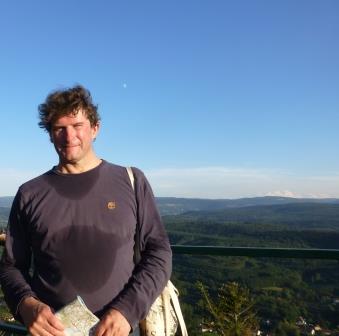
I’ve spent the last six weeks working through the notes that I made — making some very difficult decisions about dropping whole sections (the infamous ‘calendar’ chapters that I workshopped have gone), taking fragments from several chapters and altering them to form completely new scenes (there’s one continuous event in the novel that I constructed from three previously completely separate sections) and trawling through the text for consistency and checking facts (for example, I had to change a child’s age in several places when I realised there was a scene when she was in a pushchair).
Having to hand in hard copies effectively tests your self-publishing skills. I spent hours checking pedantically through the whole manuscript for formatting errors, stray punctuation and the smallest typo (although it’s sod’s law that many will inevitably remain). I had to worry about mirroring the margins for the binding, ensure that sections started on odd pages and lots of other issues that writers who e-mail Word document to a publisher don’t have to pore over.
Once I’d formatted the PDF for the professional printers it was only a few minutes’ work to create a reasonably passable e-book version of the finished MA version of the novel. It’s now on my Kindle and has made me wonder if I should spend a little more time polishing it and take the plunge and properly self-publish it. Maybe.
Certainly, the self-publishing route is becoming a much more common way of getting agent interest — as I discovered in some panel discussions when I made a fleeting visit for the second year to the York Festival of Writing at the beginning of September.
I was also surprised to hear in a session by a couple of literary agents that almost all the manuscripts that they receive as submissions are in need of a thorough line and copy edit.
Moreover they expect this, almost to the point of being a bit wary of the most perfectly edited examples, on the basis that authors are better employed on the more creative tasks of the publishing process — inventing ideas, plots and characters — rather than combing through manuscripts for errors. Proof reading is usually more effective if done by someone new to the text and it’s also a dedicated (and very different) skill in itself.
I may blog later at more length about my visit to York — Isabel Costello has written a very good blog post about the benefits of attending for a second time.
I thought I was being rather brave by attending Anastasia Sparks’s workshop on writing erotica. However, everyone seemed to be surprised that there were more men in the room than women.
However, as might have been anticipated some of the men were much more uncomfortable than the women when asked to do an exercise in erotica and then read out what they’d written — using some of the words written on the blackboard in the photo below (guess which words I volunteered). Two made rather lame excuses and refused to share even a mildly erotic word.
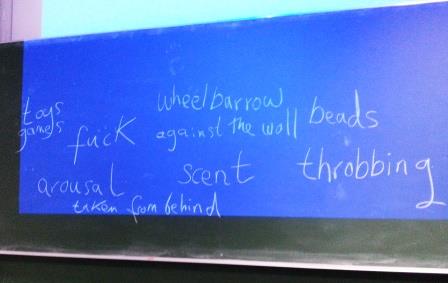
As the novel is going to be academically assessed, I didn’t want to take the risk of submitting something that looked unfinished so I’ve gone through the rather bizarre and very time-consuming process of using Acrobat’s ‘Read Out Loud’ function to speak every line of the novel in its default, robotic American monotone while I’ve read the text on the screen. (It takes about five minutes to read and correct each page this way and it’s not foolproof as corrections have a way of introducing their own typos.)
After working on something for so long, it’s amazing how many errors you can spot just by hearing the words are spoken out loud. There are some sentences in the book that have taken over three years to write — and I was still altering them at the last minute.
The proofing process over the last few days has been exhausting and, in places, very frustrating when I came across something that I wasn’t happy with but which was too complex to fix in the time available.
I’m also greatly indebted to Guy Russell, from the City course who’s very technically knowledgeable and a wonderfully humorous writer himself, for reading through a half-edited version of the manuscript in a week and giving me extremely very helpful and honest feedback.
I also did some very analytical MSc-type things with spreadsheets — making graphs of chapter lengths and finding a Word macro that allowed me to count all the unique instances of words in the novel — the number is easily into five figures. I rather like the fact I got ‘rhombus’ in the book (it’s about plate shape not a treatise on geometry), not so sure about ‘sentient’ though.
So today the novel is hitting the press at a printers and bookbinders just off the Holloway Road in London, in the shadow of the Emirates Stadium — there’s a little serendipity there as I made James an Arsenal fan and the friendly woman I’ve been talking to there is called Magda — like one of my favourite characters in the novel.
Sadly, there will only be a handful of very expensive copies but I’ll pick up a copy for myself tomorrow and it can sit proudly on my shelf — I’ll try and post a photo of it at some point when I’ve recovered from the whole draining process.
There’s still plenty I’d like to change about what I’ve submitted but at least it’s a completed novel with a beginning, middle and end, even I might dare suggest a narrative arc, and no obvious ‘work in progress’ bits of sticking plaster holding it together.
While I was at the Festival of Writing I had two one-to-one meetings with agents who’d read the first 3,000 words of the novel in advance. As with the same sessions last year, they were very positive about the writing and were keen to see more — asking me very practical questions about the novel and how I came to write it — rather than making lists of recommendations to fix faults. I guess that’s a good sign.
However, having gone through the editing process for the MA submission I realise there’s still a little more structural work that needs doing before I start submitting it in earnest, if I decide that’s the route I want to take. I’ll try to address those and then go through the proofing process again. So, the novel hasn’t quite been put to bed yet.
While I’m going to carry on updating the blog with writing and novel-related posts, I’m not intending to chronicle anything about the submission process, should I steel myself to put myself through that agony. I know from my many friends who are excellent writers that it’s a frustrating and painful process and full of raised and dashed hopes and interminable waiting. Better to maybe start talking about the next book instead.
One of the agents said she’d heard good things about the MMU MA Course, which was quite reassuring, but also took me back a little as I’d recently been so focused on completing the novel as an end in itself.
There are quite a few short courses and events now that promise some professional writers’ feedback on aspiring authors’ work, which is always useful, but what I mentioned to the agent in reply was how valuable it had been to have the input over an extended period each year in the course of three authors, each who’d each published many books of their own.
Rather than see the writing as a one-off, they got to know each student’s style and novel-in-progress over an extended period of time. While the feedback could be challenging at times, it was always encouraging.
However, it was a little disconcerting reading the reviews for my tutor in the second year’s recent book. Nick Royle’s First Novel has a protagonist who’s a creative writing lecturer, working with students on their, er, first novels. I’m sure he completely fictionalised everything in there!
I’m feeling a little rudderless and cast out into the wide-world now as I’ve been more or less constantly on writing courses (often more than one simultaneously) for the last six years. It was September 2007 when I started the Open University’s A215 Creative Writing course (highly recommended) and I’ve gone through several more, including the intensive City Certificate in Novel Writing 2009-2010, to the point where I’ve now completed the MA.
It’s taken way longer than I expected to get to the point where I can hand in a novel with which I’m reasonably happy. There was some material that I was pleasantly surprised to rediscover — ‘Did I really write that then?’ — from years ago but plenty of stuff that made me wince (which hopefully has been mostly excised now).
My friend Kathy, who I’ve known since the Open University Advanced Creative Writing course and is a Creative Writing MA herself, tells me that my writing has improved considerably since she’s known me — so I guess that’s testament to the courses and all the practice that they’ve forced me to put in. Hopefully, the process of writing the next novel (or completing the one that’s been in abeyance for the last three years) will be consequently speedier.
But at the moment, having had plenty of nights going to bed at two and being up by seven, I’m reminded of Adele Parks’s very entertaining keynote speech at this year’s Festival of Writing.
She explained how she completed her first published novel while working in a demanding day-job — ‘Basically, I gave up sleep’.
I’ll second that but wouldn’t recommend it!
Now for those left on tenterhooks by the lack of holiday photos as tantalisingly promised in the previous post, here’s a few with some relevance to the novel.
This is a wonderful view of a bend in the Rhine, taken near Boppard, a place I last visited on a school trip.
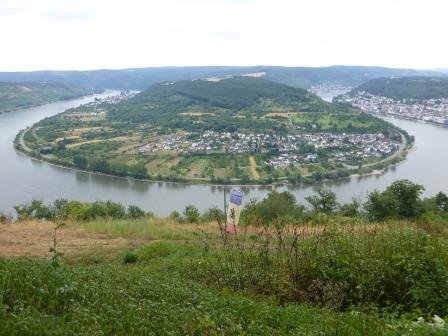
Trabants are now as scarce as the remants of the Berlin Wall.

And this peculiar view is of the ladder used by border guards to climb up a border watchtower. I climbed up and down this watchtower ladder near Potsdamer Platz and it was quite hair-raising but what I love most is how the 1980s East German lino has been preserved.
